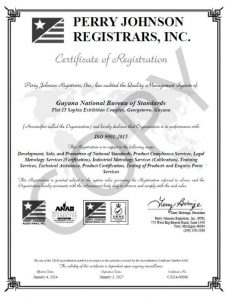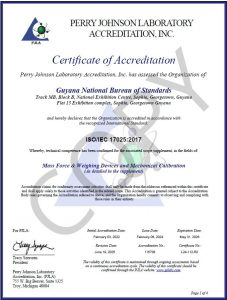It is Indigenous Heritage Month, 2020. This month is set aside to highlight the contributions of our Indigenous People to Guyana, our homeland. The theme is “Fostering traditional practices for a safe environment”
The Guyana National Bureau of Standards (GNBS) has developed a number of National Standards outlining requirements for products made particularly by the Indigenous community. These standards were developed to ensure product quality and labelling and include the Specification for indigenous furniture (bamboo, rattan, wicker, and nibbi), Specification for Cassava Bread, Specification for Spices and Sauces, and the Code of Practice for the manufacture of Wooden Craft items.
Our indigenous people are well known for their fine arts and crafting abilities which have allowed them to produce classy and unique pieces of furniture from plant materials in their surroundings. Locally, and even in many other parts of the world, these pieces of furniture and other wooden craft items are in high demand and are well priced, especially when they are produced according to recognised standards. In addition, many foods originating from natives are desired dishes for many locals and visitors. Making these products in a manner that conforms to the requirements of standards can add value and confidence in their quality and increase demand.
The Specification for indigenous furniture (GYS 509:2013) is a CARICOM Standard, which was adopted by the Guyana National Bureau of Standards (GNBS). The standard was developed to benefit manufacturers by the harmonisation of requirements for the manufacture of various types of furniture, suitable for both domestic and commercial use. It covers material requirements, which are selected for rattan, wicker, and nibbi furniture and these shall be characterised by lightness, flexibility, durability, and smoothness with no hair-like strands hanging from them. Based on the standard, indigenous furniture shall be constructed with good workmanship components, which shall be of quality and uniformity.
The Code of practice for the manufacture of Wooden Craft items (GCP 31:2010) is also a CARICOM Standard, which establishes the minimum requirements for the manufacture and production of wooden craft items. The standard focuses on performance rather than prescriptive requirements and may be applied to all wooden craft items in the manufacturing stage or at the point of sale to retailers and end consumers. The standard stipulates requirements for materials used in manufacture including wood, adhesives, finishes or finishing material, and hardware. It also includes health, safety, storage, environmental, packaging, and labelling requirements.
The Specification for Cassava Bread (GYS 246:2010) specifies requirements for cassava bread and related products, intended for human consumption, obtained from the processing of bitter cassava. The standard offers guidance to makers of the product on quality requirements, contaminants, sampling, packaging, labelling, hygiene, and production.
Lastly, some many popular spices and sauces are produced within indigenous communities, including thyme, hot pepper sauces, and the very popular cassareep. The Specification for Spices and Sauces (GYS 506:2013) provides requirements for the identification, composition, purity, hygiene in processing, labelling, sampling, and testing of these spices and sauces.
The GNBS can offer technical guidance to users of the aforementioned standards. Those desirous of implementing the requirements are encouraged to acquire copies of the respective standards, which are available at the GNBS. Remember, following the requirements of standards can guarantee the production of quality products and increase consumer preference.
For further information, please contact the GNBS on Tel: 219- 0066, message us on WhatsApp: 692-GNBS (4627) or like us on facebook: @gnbsgy






